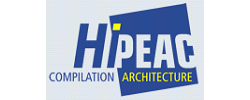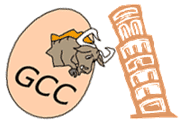|
Workshop Organizers:
- Dorit Nuzman
IBM, Israel
- Grigori Fursin
INRIA, France
Program Committee:
- Arutyun I. Avetisyan
ISP RAS, Russia
- Zbigniew Chamski
Infrasoft IT Solutions, Poland
- Albert Cohen
INRIA, France
- David Edelsohn
IBM, USA
- Bjorn Franke
University of Edinburgh, UK
- Grigori Fursin
INRIA, France
- Benedict Gaster
AMD, USA
- Jan Hubicka
SUSE
- Paul H.J. Kelly
Imperial College of London, UK
- Ondrej Lhotak
University of Waterloo, Canada
- Hans-Peter Nilsson
Axis Communications, Sweden
- Diego Novillo
Google, Canada
- Dorit Nuzman
IBM, Israel
- Sebastian Pop
AMD, USA
- Ian Lance Taylor
Google, USA
- Chengyong Wu
ICT, China
- Kenneth Zadeck
NaturalBridge, USA
- Ayal Zaks
IBM, Israel
|
Web shortcut: http://cTuning.org/workshop-grow10
GROW workshop focuses on current challenges in research and development of compiler analyses and optimizations based on the free GNU Compiler Collection (GCC). The goal of this workshop is to bring together people from industry and academia that are interested in conducting research based on GCC and enhancing this compiler suite for research needs. The workshop will promote and disseminate compiler research (recent, ongoing or planned) with GCC, as a robust industrial-strength vehicle that supports free and collaborative research. The program will include an invited talk and a discussion panel on future research and development directions of GCC.
Topics of interest:
Any issue related to innovative program analysis, optimizations and run-time adaptation with GCC including but not limited to:
- Classical compiler analyses, transformations and optimizations
- Power-aware analyses and optimizations
- Language/Compiler/HW cooperation
- Optimizing compilation tools for heterogeneous/reconfigurable/ multicore systems
- Tools to improve compiler configurability and retargetability
- Profiling, program instrumentation and dynamic analysis
- Iterative and collective feedback-directed optimization
- Case studies and performance evaluations
- Techniques and tools to improve usability and quality of GCC
- Plugins to enhance research capabilities of GCC
Paper Submission Guidelines:
Submitted papers should be original and not published or submitted for publication elsewhere; papers similar to published or submitted work must include an explicit explanation. Papers should use the LNCS format and should be 15 pages maximum. Manuscript preparation guidelines can be found at the LNCS specification web site (go to -> For Authors -> Information for LNCS Authors). Please, submit via the GROW'10 easychair system.
Papers will be refereed by the Program Committee and if accepted, and if the authors wish, will be made available on the workshop web site. Authors of the best papers from the workshop may be invited to revise their submission for the journal Transactions on HiPEAC, if the work is in sufficiently mature form.
Important Dates:
| Deadline for submission:
| November 22, 2009
|
| Decision notification:
| December 14, 2009
|
| Deadline for camera-ready papers:
| January 6, 2010
|
| Workshop:
| January 23, 2010 (half-day)
|
Keynote talk:
Diego Novillo (Google, Canada)
Using GCC as a toolbox for research: GCC plugins and whole-program compilation
Despite its age and internal crustiness, recent developments in GCC will allow researchers and practitioners to take advantage of a rich set of tools and analyses that were previously hiding under the covers. In this talk, I will discuss how plugins and whole-program compilation facilitate extending the compiler and convert it into a more flexible tool for purposes other than optimization.
Previous Workshops:
Misc:
- MILEPOST GCC - community-driven machine learning enabled research compiler
|

